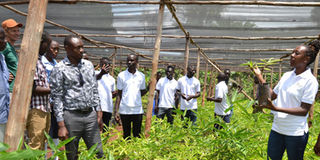Government unveils 375,000-hectare Bamboo industry restoration plan

Environmentalists and forestry students led by Ms Devine Nabaweesi (R), the chief executive officer Devine Bamboo during the international Bamboo day celebrated in Luweero on September 22,2019. PHOTO BY DAN WANDERA
Government has outlined a 10-year plan where Shs162.6 billion is needed for the regeneration of 375,000 hectares of both plantation and natural bamboo forest cover widely known for its multiple and diverse economic and climate change mitigation potentials.
The bamboo, a non-timber forest resource with a potential for food, construction, craft materials, fuel wood, fodder and a contributor to the national economy through taxes on bamboo industries and products, soil and water conservation in Uganda currently covers about 54,533 hectares, according to a study undertaken by the International Bamboo and Rottan Organization (INBAR) in 2018. It has attracted the attention of government with a wider focus and strategy to harness the bamboo resources for economic, social and environmental benefits for Ugandans.
“The Ministry of Water and Environment is at the forefront of seeing the bamboo industry flourish with a robust annual bamboo seeds distribution programme across various regions and ecological zones in the country where an estimated 40,000 bamboo seedlings are distributed each year as part of the government intervention. About Shs162.6 billion from government, development partners and the private sector will be needed to develop the bamboo industry within the next 10 years where we target 375,000 hectares in both plantation and natural regeneration,” Mr Issaa Katwesige, the principal forest officer Ministry of Water and Environment said at the commemoration of the World Bamboo Day celebrated in Luweero District at the weekend.
Through the Farm Income Enhancement and Forest Conservation Project II, the restoration of the degraded rivers and stream banks for Manafwa, Bududa, Kween, Bukwo, Kapchrwa, Kasese estimated at 2500kms has been planned where about 150kms has so far been restored, Katwesige who represented government at Degeya village in Bombo Town Council where Divine Bamboo hosted the World Bamboo Day celebrations, added.
Mr Abdul Kabanda, a farmer at Deheya Village in Luweero who has already planted the bamboo says the economic empowerment of the farmers through training programmes and formation of cooperatives to attract funding from both government and development partners is important.
“We need to understand the market trends for bamboo products on top of boosting the climate change mitigation. This can be more possible through a robust sensitization of the population,” Mr Kabanda said.




